Читать книгу Posthuman Feminism - Rosi Braidotti - Страница 17
Queer and Trans Inhumanism: Equality and Diversity
ОглавлениеLGBTQ+ theories and practices are positioned in the aftermath of humanism in that they pursue the political project of emancipation with claims to equality and struggles for recognition and justice. These claims rest on a sense of radical alienation from the heteronormative idea of the human built into European humanism. Many queer and trans feminists express a deeper bond to other species, notably animals, or rather ‘transanimals’ (Hayward and Weinstein, 2015). They feel not only excluded from, but also deviant, abnormal and monstrous in relation to the dominant definition of the human. Socially coded as ‘unnatural’ in their rejection of compulsory heterosexuality and reproductive normativity, queer and trans theorists deploy an extreme form of dis-identification from the Vitruvian humanist image of ‘Man’. Queer and trans theorists join forces with disability studies scholars in critiquing the discriminatory aspects of that idealized depiction of human normality.
Queer and trans feminisms work on the intersectional resonances between sexuality, gender, race, colonialism and the full range of the non-humans. They prefer the category of ‘inhumanism’ to indicate their liminal and marginal position in relation to the hegemonic figure of ‘Man’. But ‘inhuman’ also refers to the violence and the various forms of de-humanization inflicted upon LGBTQ+ people, in social, environmental and symbolic terms (Muñoz, 2015). Strongly allied to the dehumanized and non-human others, LGBTQ+ theories stress the parallels between the treatment of sexualized and racialized others, their increased vulnerability and mortality.
What also binds them is the shared desire to escape from the power of heteronormativity scaled on an abstract notion of ‘Man’ and a binary gender system either by equalizing rights and entitlements and thus fight back against the exclusions, or by devising altogether new visions of what humans could become. That points to the posthuman moment, which includes the production of alternative ways of knowing, new epistemologies and new ways of relating to and understanding the contemporary world. Susan Stryker sums it up clearly: ‘(In)human thus cuts both ways, toward remaking what human has meant and might yet come to be, as well as toward what should be turned away from, abandoned in the name of a better ethics’ (2015: 228).
Rejecting the naturalization of the normative model of the human, LGBTQ+ theorists want to be rescued from a human condition that spells contempt and disqualification for them. As Emi Koyama (2001) put it: ‘transfeminism views any method of assessing sex to be socially and politically constructed and advocates a social arrangement where one is free to assign his or her own sex (or non-sex, for that matter)’. Transfeminists consequently explore multiple possibilities for constructing alternative bodies, relying on technological interventions – be it bio-chemical, technological or surgical – to achieve their mutations (Preciado, 2013a). This ethics of self-transformation is in fact a collective, relational political project. Through such intense mediation, LGBTQ+ theorists escape the humanist model, while getting re-grounded and re-materialized as enhanced or alternative embodied subjects. This double pull – towards de- and re-materialization – is a constant process that deigns posthuman subjectivity. While this is an energizing and affirmative practice, the sheer reliance on technological mediation and the pursuit of a project of perfecting embodied selves through science and technology, brings queer and trans theories paradoxically closer to the Enlightenment project. Scientific reason and technoscience become the means to achieve a political revolution and to get out of the injustices of a social order based on an idea of human nature indexed on the qualities of the ‘Man of Reason’, which discriminates and excludes the sexualized and racialized sub-humans.
Queer and trans in-humanness indicate these fraught trajectories: to ascribe to the humanist creed of emancipation and full equality for all, while also being painfully aware that the lofty ideal could never do justice to the complexity, impurity and generative force of their anomalous vitality. LGBTQ+ people want in, although the desire to get out of the patriarchal heteronormative colonial and ableist world remains overwhelming.
